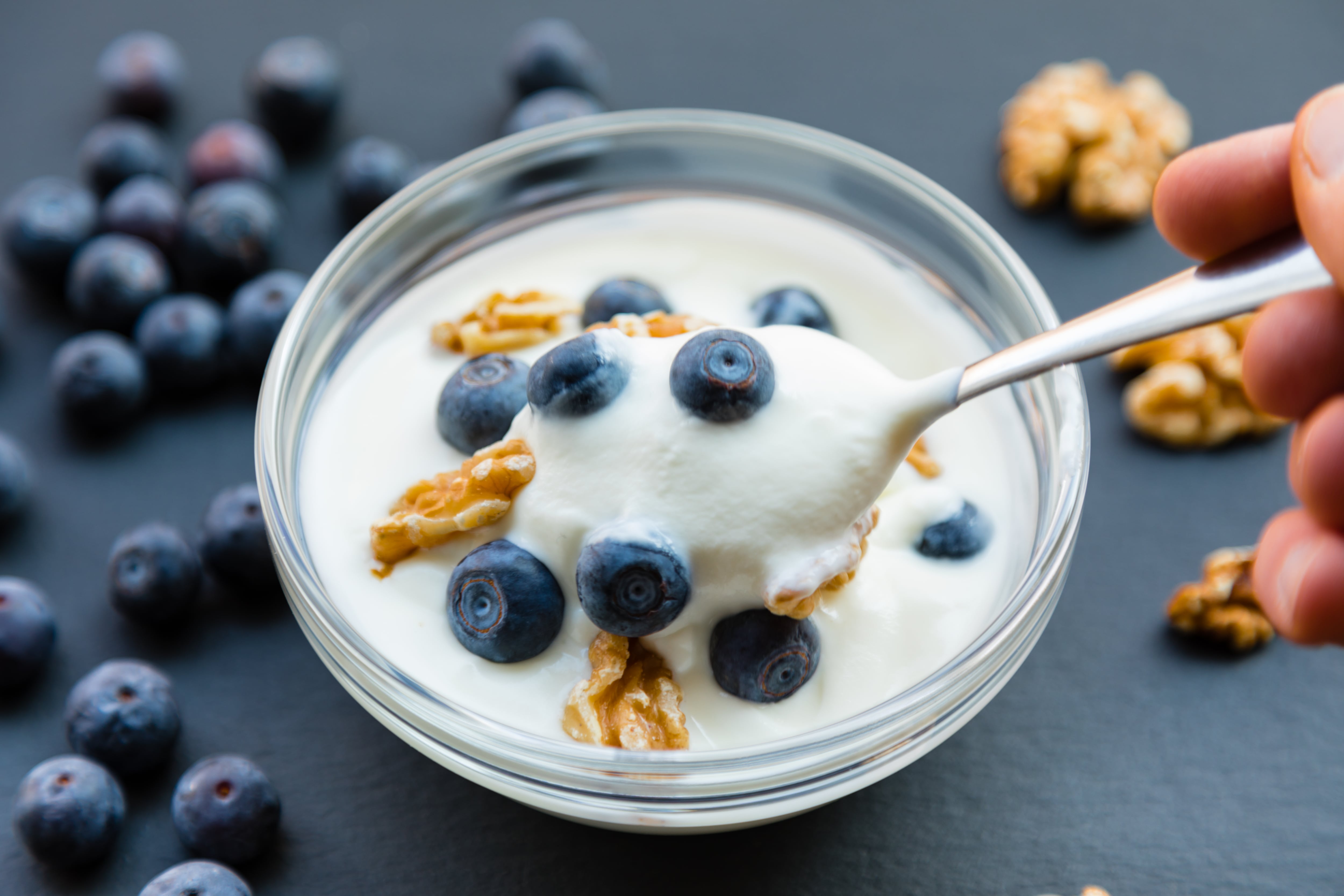Danone’s yogurt portfolio is enjoying a strong momentum in North America, as consumers continue to prioritize health and wellness through nutrient-dense and functional foods.
High-protein dairy has been a major sales driver for Danone’s yogurt business – but the impact of probiotic yogurt brand Activia has also been growing.
In part, this is the result of Danone’s efforts to re-establish Activia as a gut health staple, a strategy that’s already reaping rewards. Last November, Juergen Esser, group deputy CEO and CFO, told investors that Activia was making ‘very good progress’ in multiple regions.
“The repositioning of the brand, going back to a very clear position on gut health, very clear positioning on the health benefits, is working for us (…) in Europe as well as in North America,” he said. “And you will see that moving forward, we will be even clearer on the benefits and the claims of this great brand.
High-protein dairy: another winner
Danone’s high-protein yogurt range has been a major sales driver in recent years. Within EDP, net sales of high-protein performance products have more than doubled, growing from €400m in FY21 to more than €1bn by Q3 2024.
In Q3 2024, high-protein products also posted strong double-digit growth.
“This brand has a fantastic potential. We have been creating the conditions over the last two years to go back to growth, and we are seeing that sequentially getting into our results.”
So how is the dairy major working to advance innovation in the gut health space – and respond to consumer demand for probiotic yogurt? We speak to Miguel Freitas, Ph.D., VP of Health and Scientific Affairs at Danone North America, to find out.
Feeding the ‘second brain’
There are three major areas of consumer interest the company is working to address through probiotics research and innovation: digestive health, brain health, and the impact of specific probiotics on the microbiome.
“Gut health is really a major focus for American consumers – in fact, many are citing gut health as the number-one most important aspect of their overall health,” Dr. Freitas opened. “That makes sense, given what we’re seeing in the research field. More and more studies suggest that the impact of gut health, specifically of the gut microbiome, is incredibly far-reaching.”
Boosting gut health
Focus on fermented dairy
Yogurt beverages is another segment poised for expansion in the US, with cultured dairy products such as kefir in double-digit growth in both sales and household penetration terms.
According to Circana, sales of yogurt drinks (+7.3%) and kefir (+24.7%) grew year over year, and household penetration increased almost 9% for yogurt drinks and 15% for kefir (52 weeks ending September 8, 2024).
In North America, Danone has actively pursued the acquisition of Lifeway Foods - but its two approaches were turned down by the kefir maker.
In Europe, Danone expanded the Activia portfolio to include a range of plain and flavored kefir, in a bid to tap into these growing markets in the UK and France.
Improving digestive health is a key priority for consumers and therefore a big focus for Danone’s probiotic yogurt offering.
“About half of the general population in Western countries frequently experience digestive issues,” Dr. Freitas said. “That’s where our Activia probiotic product comes in. For Activia, we chose our exclusive probiotic strain Bifidobacterium animalis lactis DN-173 010/CNCM I-2494, for its ability to survive, and passage through the entire gastrointestinal tract.
“In addition, two double-blind, randomized, placebo-controlled studies show that Activia may help reduce the frequency of minor digestive discomfort when consumed twice a day for two weeks as part of a balanced diet and healthy lifestyle.”
Supporting the gut-brain axis
The gut-brain axis is another area informing R&I efforts – and consumer awareness of the link between gut and mental wellness is also increasing.
“The mind-gut connection and role of probiotics is one of the most exciting areas of research in the probiotics field today,” Dr. Freitas said. “Experts call the gut our ‘second brain’, and for a very good reason. After the brain, our gut hosts the largest number of neurons in the body.
“Physicians often hear from patients that they never felt anxious until they started experiencing some issues with their gut.”
“The gut-brain connection has been recognized for many years, but only recently researchers are discovering that the gut microbiota can also have an impact on brain function and human behavior,” Dr. Freitas said.
“Because the gut has its own nervous system, it can generate many of the same chemicals or neurotransmitters that the brain generates – including serotonin, which plays a key role in sleep, appetite, pain sensitivity, overall well-being, and is also known for stabilizing our mood and feelings of happiness.”
General health: From immunity to weight management
Studying how specific probiotics impact the gut microbiome and microbiota is another area of interest for the company.
This is in part driven by the potential to advance personalized nutrition solutions for the general consumer – for example, by developing probiotic-enhanced foods that support weight management.
Food wins out over supplements
According to Dr. Freitas, consumers crave the familiarity of food when looking to boost their digestive health, at the expense of supplements.
“Even when functional benefits are prioritized, consumers still desire taste and ‘real food’ cues – which makes probiotic yogurt more appealing than supplements,” he told us.
“With the caveat that the science is still in its infancy on this, research studies point to a link between certain probiotics and weight management,” Dr. Freitas explained.
For example, probiotic-fermented dairy foods may support consumers’ weight management aims, including the health and wellness objectives of people on GLP-1 medications. These foods can improve gut microbiota, which, in turn, can have positive metabolic effects, he said.
“In addition, fermented dairy products with probiotics usually contain other nutrients that are important for people managing their weight, such as calcium, certain fatty acids, and protein, which has a critical role specifically for patients taking GLP-1 medications,” he added.
Danone is also looking into next-generation probiotics - beneficial microbes programmed to deliver health benefits in a more targeted way - to enable superior functional dairy formulations that tap into the personalized nutrition trend.
Functional alt dairy
Danone is also leveraging biotics in its dairy alternatives R&D, with the view to create nutritionally-superior products.
“When it comes to product development, we’re not only looking at products that can help restore the microbiota of anyone in dysbiosis—that is, unbalanced microbiome—but also at products that nourish the good bacteria in our gut and ultimately support gut health,” Dr. Freitas explained. “And this can be achieved with certain probiotics and prebiotics.
“The technologies today allow us to incorporate blends of probiotics and prebiotics both in dairy and dairy analogs, even when fermentation is required.”
Research in the biotics space is evolving outside of probiotics and prebiotics to also look at postbiotics, he added.
“Postbiotics are ‘a preparation of inanimate microorganisms and/or their components that confers a health benefit on the host’. For example, they can include metabolites like short-chain fatty acids, certain enzymes or vitamins.
“Research in this area is still new, but it’s one to watch as we continue to learn more about leveraging biotics for health in general.”
Danone’s gut microbiome fellowship grant opens for entries
Danone North America is looking for the next breakthrough in gut health research through its annual fellowship grant program.
The company will award $25,000 each to two graduate students wishing to study the links between the microbiome, probiotics and yogurt in supporting and maintaining health and wellness. Previous award winners have explored these links, such as the effects of probiotics on metabolism, how the early-life microbiota protects against obesity, how gut bacteria and food intake influence brain development, and more.
Applicants must be at least 18 years of age, show proof of US residence and be able to utilize the scholarship funds during the 2025 academic year at an accredited US institution.
For more information, visit: fellowship-application.danonenorthamerica.com


